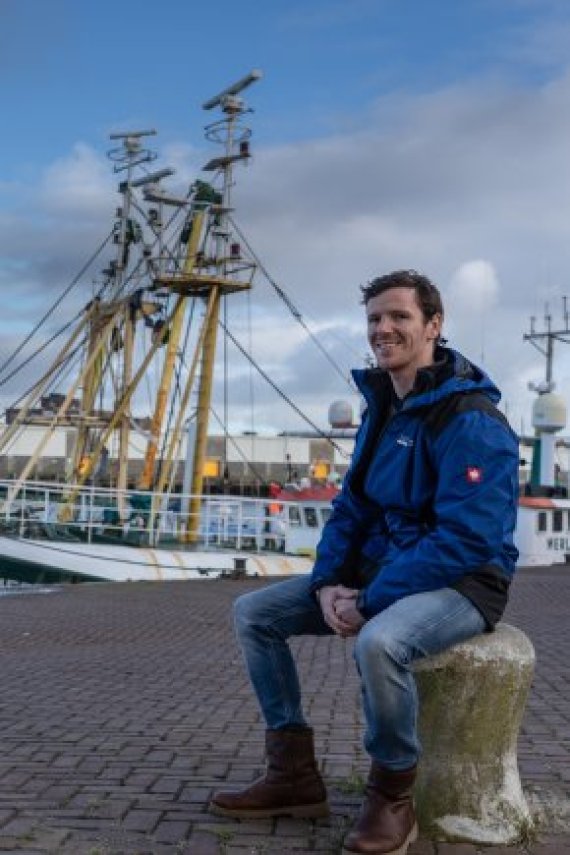text and photo Tessa Louwerens
‘Sorry about the smell,’ says Meeldijk, a fisheries researcher with Wageningen Marine Research (WMR). ‘I came back from a week at sea on Friday, and I just left my oilskins in the cupboard, thinking I would rinse them out after the weekend.’ Meeldijk used to wear his oilskins almost every day when he still worked on a crab fishing boat. Now he has swapped them for WMR’s navy blue windproof jacket. He has been working here since September.
Fed up with being indoors
Meeldijk grew up with fishing. ‘Every holiday from the age of seven, I went out on the boat with my father to fish for shrimp and crabs. I loved it, although I was always aware that there were other things I could do with my life than fishing.’ At secondary school, Meeldijk developed a love of history, which he then studied at university. ‘I grew up in fisheries, but history is my own real passion.’ That is reflected in his office, with its walls covered in historical navigation charts. There is a fossil on the desk too. ‘A mammoth tooth that I once fished up on the Brown Bank between the UK and the Netherlands.’
And yet, when he graduated, Meeldijk did go to sea. ‘At that point I was fed up with sitting indoors, although I didn’t expect to go on fishing for four years.’ On one trip, he met the WMR researcher Michiel Dammers. ‘We got talking and I found it extremely interesting.’ The seed was planted, although Meeldijk had not had enough of fishing quite yet. But when he got the chance to work as a researcher, he did change course.
Extensive network
Meeldijk now works on innovation for fishing nets at WMR. ‘At the beginning of 2019, The Haringvliet dam was opened to let migrating fish such as salmon and sea trout through. These fish end up in shrimp fishers’ nets as unwanted bycatch. We look at whether that can be prevented by changing the design of the nets. That is better for both the migrating fish and the fishers.’ Meeldijk sees his fishing background as a definite advantage in his current work, especially thanks to his extensive network. ‘I can always give someone a call if we need fishers in Zoutkamp, for example, or if we are looking for boats that use a particular fishing technique. Because there is trust, and I can easily chat with them about all the various fisheries, it is easy to make contact.’
A different role
His ex-colleagues have reacted positively to his switch. ‘They think it’s good that there’s someone with practical experience in the research now. Because I know both worlds, I can help improve communication between them. To prevent misunderstandings that put fishers on their guard, it matters a lot how things are expressed. Of course I’ve got a different role now: I think like a scientist and not like a fisher. If fishers take ‘we must make money’ as their motto and therefore flout the rules, invalidating our research, I make a fuss. Luckily that hasn’t happened so far, but in that sort of thing I don’t hesitate to speak out.’
Because I know both worlds, I can help improve communication between them
Odd one out
Meeldijk realizes that he still has a lot to learn as a researcher. ‘Most of the people here are biologists. As a practitioner and someone who studied the humanities, I am a bit of an odd one out. We teach each other new ways of thinking. Biologists know everything about all the different fish species, whereas as a fisher I was first and foremost interested in the species I wanted to catch. On the other hand, I know a lot about the different techniques used on board, and about how and where to fish.’
Cooking workshops
So far, Meeldijk is happy with his career move into research. ‘I was always curious and there is so much happening in fisheries, including in the field of innovation. Now I am directly involved in that. Being at home so much takes a bit of getting used to, and the same goes for my girlfriend. But I think she likes it.’
The ex-fisher has plenty of ideas for filling the extra time he now has. He is collaborating with the fisheries knowledge platform Vist ik het maar on a project aiming to document the history of the Dutch fishing communities. He also likes cooking and he recently gave his first cooking workshop. ‘I hear a lot of people saying they want to eat less meat so they are becoming vegetarians. I think that’s a pity, because it’s no problem to eat fish. It is healthy and tasty, and North Sea fish stocks are fine. People often don’t know how to cook fish.’
Meeldijk is not afraid he will miss life on a fishing boat. ‘I am staying in the same world, but in a new job that suits me better. Every Friday afternoon when they boats come in, I take a walk along the quay and have a chat. I can’t imagine life without the fisheries.’
| Cees Meeldijk (Wieringen, 1992) | 2011 – 2015 | Student of History at University of Groningen, and University of Amsterdam |
|---|---|---|
| 2015 – 2019 | Crab and shrimp fisher | |
| 2019 – present | Fisheries researcher at WMR |
Cees Meeldijk (27) was born in Wieringen and now lives with his girlfriend in Heemskerk.

